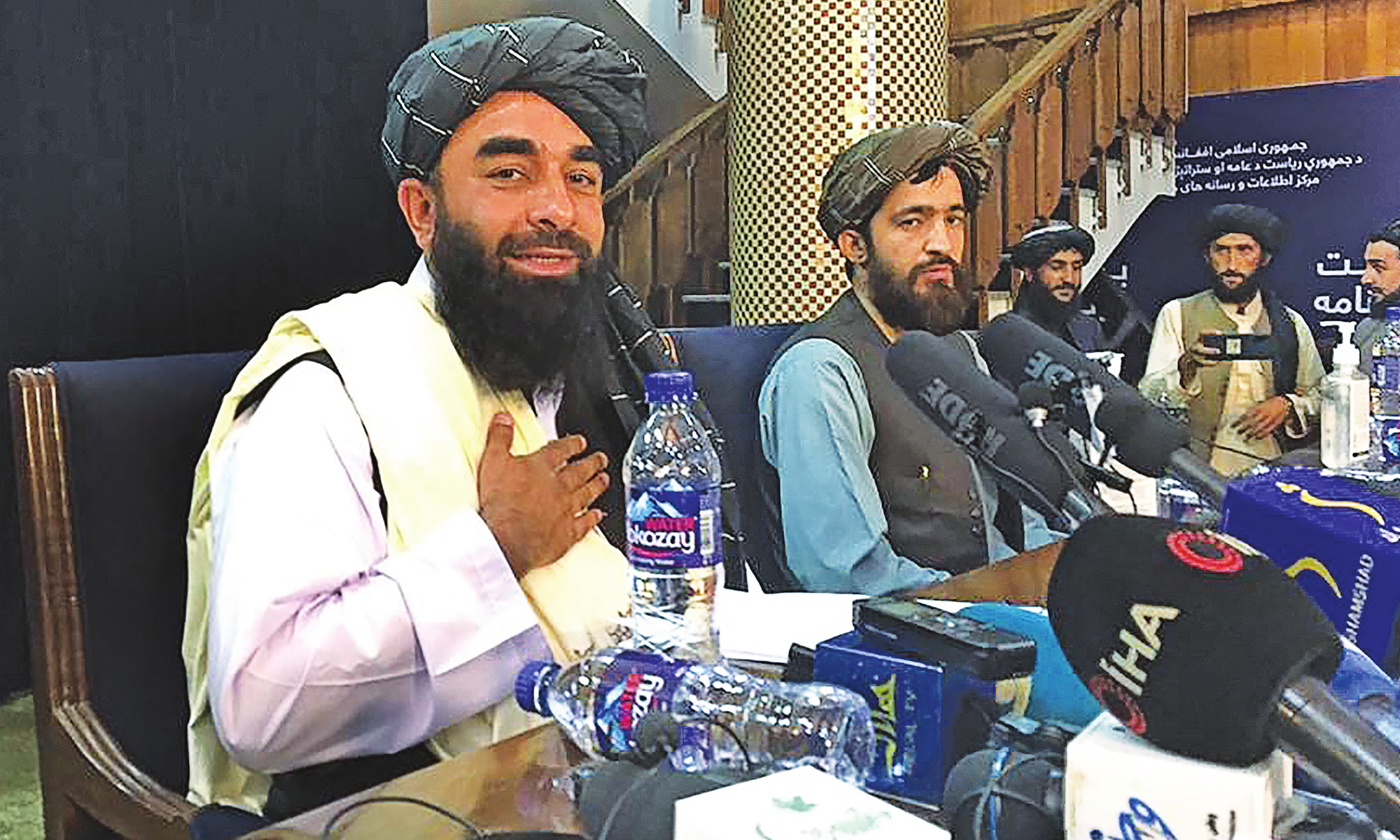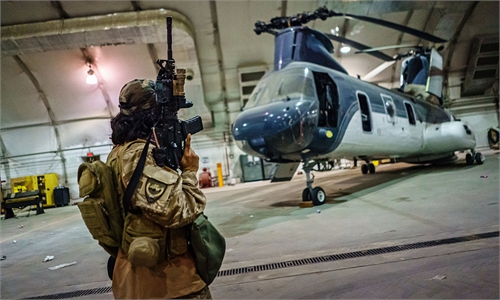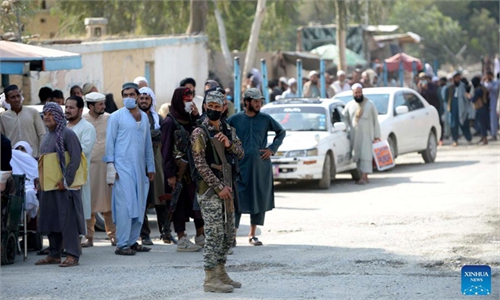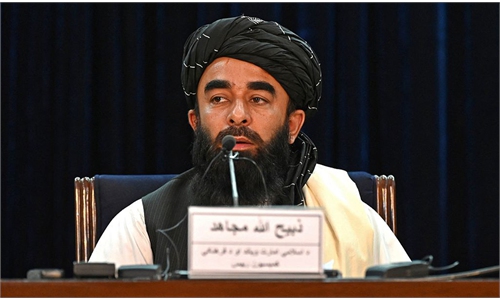
Taliban spokesperson Zabihullah Mujahid (left) gestures as he arrives to hold the first press conference in Kabul on Tuesday following the Taliban rapid takeover of Afghanistan. The Taliban declared that they wanted peaceful relations with other countries and would respect the rights of women within the framework of Islamic law. "We don't want any internal or external enemies," Zabihullah Mujahid said. Photo: AFP
The Taliban have announced an interim government in Afghanistan on Tuesday, with the leading member of the organization Mullah Hasan Akhund appointed as prime minister. Even so, the group still faces some serious challenges.First, the Taliban are facing an ideological challenge to find a balance between adhering to Islamic fundamentalism and achieving moderation, inclusiveness, and openness.
In terms of the personnel structure of the new government, the leaders of some substantive ministries (such as the Interior, Defense, and Foreign Affairs) are all Taliban members. But Taliban spokesperson Zabihullah Mujahid also stressed that the cabinet is only an "acting" government and that the group will "try to take people from other parts of the country." So the Taliban are still expected to keep their promise to build up an "open, inclusive Islamic government."
In the future, some other non-important departments will probably absorb people outside the Taliban. According to Taliban spokesperson Suhail Shaheen, the new government in Afghanistan will include "other Afghan politicians and personalities." This should mean former government officials, secular people, and non-Pashtuns. This is the open, inclusive and moderate side currently being espoused by the Taliban.
However, Islamism is the basic ground color of the Taliban, and adhering to Islam's legal system of Sharia is the bottom line of the Taliban. In their first news conference since taking over the country, the Taliban have emphasized the need for rule under Islamic law. They have promised to respect Afghan women's rights to work and study, but within the limits of Islam. This nakedly demonstrates that Islamism remains the core ideology of the Taliban.
Judging from the policies and behaviors of the mainstream Taliban, their pursuit of openness and inclusiveness is largely true and credible. But the organization still needs to figure out ways to unify consensus internally and bridge the differences between the hardliners and moderates inside the group.
Second, a possible change of the Taliban is to abandon their past adherence to extremism. But they also face the challenge of how to completely cut themselves off from extremist organizations and groups operating inside Afghanistan. Islamic extremism is a general term for the radical or extremist ideological views, political and social ideas of contemporary Islamism. It is essentially characterized by conducting violent terrorist activities in the name of religion. The Taliban's policy practice from 1996 to 2001 was basically based on adherence to Islamism and further to Islamic extremism. Some of the Taliban's extreme practices back then were manifestations of Islamic extremism. It included the destruction of the Buddhas of Bamiyan in Afghanistan, frequent violent terrorist attacks, harsh public punishments, as well as their interactions with Al Qaeda.
At present, the moderation of the Taliban is mainly about changing the Islamic extremism in the past. It means that the Taliban may give up some of their extreme practices, but they will also face the problems of how to limit and restrain hardliners inside their organization from extreme practices.
Externally, the Taliban have to disassociate themselves from extremist groups such as the Pakistani Taliban and Al Qaeda. They also have to curb the expansion of the Islamic State Khorasan Province, which is also known as ISIS-K. Only in this way can the Taliban fulfill their promise to make a clean break with all other extremist and terrorist groups and not allow any terrorist group to exist in Afghanistan and threaten other countries.
Last, the Taliban face the problem of identity and role transformation, especially the challenge of gaining international legal identity and integrating into the international community.
In Afghanistan, the Taliban used to have multiple identities, such as an extremist organization and rebel group. And they were closely associated with terrorist organizations. However, in the future, they should transform themselves into the ruler of the country. In particular, they should give up extremist ideology and behavior, as well as illegal economic activities, including drug smuggling.
On the international stage, the Taliban are faced with the mission of gaining international recognition and membership of the United Nations through self-transformation. In this process, the key lies in their own realization of real moderation and clean break with extremist and terrorist organizations. At the same time, they need to show their relatively mature ability to govern the country and to represent Afghanistan's sovereignty. This also requires the Taliban to carefully manage their relations with neighboring countries, great powers, and international organizations. The Taliban should safeguard their national independence while avoiding conflict and confrontation especially in their interactions with the US and the West in general.
In addition, what still remains unclear is which form of government the Taliban-led Afghan government is going to adopt. The Taliban has already declared the "Islamic Emirate of Afghanistan," a name the organization has been calling itself since 1996. But the title of "prime minister" in the new cabinet is usually used in republican countries. This may be a sign that an Islamic emirate with shades of the system of republic might be formed under the leadership of the Taliban. If the Afghan Taliban wants to be accepted by the global community and demonstrate the inclusivity of the new government, then it needs to establish an Islamic republic instead of a pure emirate.
The author is a professor at the Middle East Studies Institute of the Shanghai International Studies University. opinion@globaltimes.com.cn



